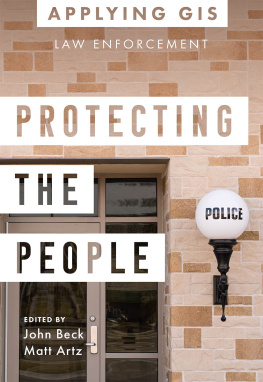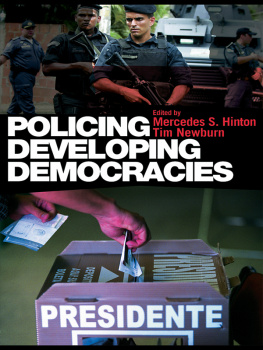In seeking to examine the dilemmas and legal implications of proactive policing through an intelligence-led approach, the editors have collated some insightful chapters that raise important questions about risk and accountability in the crime prevention domain. As Western police services are increasingly interested in forecasting threats rather than reacting to events, the chapters in this book are a timely discussion of the challenges of reducing uncertainty while retaining democratic principles. Chapter authors are largely Scandinavian, lending a refreshing perspective to this interesting book.
Jerry H. Ratcliffe, Professor in the Department of Criminal Justice and Director of the Center for Security and Crime Science, Temple University, USA
Nordic criminology has long been appreciated internationally for its penetrating theoretical insights and solid research tradition. This book is a welcome contribution to the literature on intelligence-led policing by the leading lights of 21st century Scandinavian police research. Pre-crime, preventive and pro-active policing, surveillance and intelligence analysis are all part of a complex professional language usually only addressed in terms of efficacy. This book goes beyond questions concerning what works in intelligence-led policing. Instead, this book asks the ethical questions and gets at what matters in policing.
James Sheptycki, Professor of Criminology, Faculty of Liberal Arts and Professional Studies, York University, Canada
This rich collection of academic contributions on intelligence-led policing should be regarded as a timely arrival in the era of counter-terrorism, in which surveillance, undercover methods and predictive risk assessment are becoming widely accepted and applied to a growing range of crimes and public offences. By its very nature intelligence-led policing is covert and intrusive, which leaves no opportunity for citizens to consent. The reduction of due process guarantees should be a major source of concern: not only border police but all forms of law enforcement and social scrutiny now routinely work with predictive algorithms, in which each and every individual is framed, whether criminal or not. The authors are right to claim that this reconfiguration of powers, organizational rationales and technological innovations is potentially toxic and that it should spark a social debate about the relationship between police, politics and communities.
Monica den Boer, Director of SeQure Research & Consultancy and Adjunct Professor at the Department of Criminology and Security Studies, Macquarie University, Sydney, Australia
Moral Issues in Intelligence-led Policing
The core baseline of intelligence-led policing is the aim of increasing the efficiency and quality of police work, with a focus on crime analysis and intelligence methods as tools for informed and objective decisions both when conducting targeted, specialised operations and when setting strategic priorities. This book critically addresses the proliferation of intelligence logics within policing from a wide array of scholarly perspectives. It considers questions such as:
How are precautionary logics becoming increasingly central in the dominant policing strategies?
What kind of challenges will this move entail?
What does the criminalisation of preparatory acts mean for previous distinctions between crime prevention and crime detection?
What are the predominant rationales behind the proactive use of surveillance measures in order to prevent attacks on national security?
How are new technological measures, increased private partnerships and international cooperation challenging the core nature of police services as the main providers of public safety and security?
This book offers new insights by exploring dilemmas, legal issues and questions raised by the use of new policing methods and the blurred and confrontational lines that can be observed between prevention, intelligence and investigation in police work.
Nicholas R. Fyfe is Professor and Associate Dean in the School of Social Sciences at the University of Dundee, UK, and Director of the Scottish Institute for Policing Research.
Helene O. I. Gundhus is Professor at the Department of Criminology and Sociology of Law at the University of Oslo, Norway, and Professor II at the Norwegian Police University College.
Kira Vrist Rnn is a lecturer at the Metropolitan University College in Copenhagen, Denmark.
Routledge Frontiers of Criminal Justice
www.routledge.com/Routledge-Frontiers-of-Criminal-Justice/book-series/RFCJ
Policing in Taiwan
From Authoritarianism to Democracy
Liqun Cao, Lanying Huang and Ivan Y. Sun
Reparation for Victims of Crimes against Humanity
The Healing Role of Reparation
Edited by Jo-Anne M. Wemmers
Victims of Violence and Restorative Practices
Finding a Voice
Tinneke Van Camp
Long-Term Imprisonment and Human Rights
Edited by Kirstin Drenkhahn, Manuela Dudeck and Frieder Dnkel
Working within the Forensic Paradigm
Cross-discipline Approaches for Policy and Practice
Edited by Rosemary Sheehan and James Ogloff
Positive Criminology
Edited by Natti Ronel and Dana Segev
Inmates Narratives and Discursive Discipline in Prison
Rewriting Personal Histories Through Cognitive Behavioral Programs in Prison
Jennifer A. Schlosser
Municipal Corporate Security in International Context
Kevin Walby and Randy K. Lippert
Victims and Restorative Justice
Edited by Ivo Aertsen, Inge Vanfraechem and Daniela Bolivar
The Role of Community in Restorative Justice
Fernanda Fonseca Ronseblatt
Moral Issues in Intelligence-led Policing
Edited by Nicholas R. Fyfe, Helene O. I. Gundhus and Kira Vrist Rnn
First published 2018
by Routledge
2 Park Square, Milton Park, Abingdon, Oxon OX14 4RN
and by Routledge
711 Third Avenue, New York, NY 10017
Routledge is an imprint of the Taylor & Francis Group, an informa business
2018 selection and editorial matter, Nicholas R. Fyfe, Helene O. I. Gundhus and Kira Vrist Rnn; individual chapters, the contributors
The right of Nicholas R. Fyfe, Helene Oppen Gundhus and Kira Vrist Rnn to be identified as the authors of the editorial material, and of the authors for their individual chapters, has been asserted in accordance with sections 77 and 78 of the Copyright, Designs and Patents Act 1988.
All rights reserved. No part of this book may be reprinted or reproduced or utilised in any form or by any electronic, mechanical, or other means, now known or hereafter invented, including photocopying and recording, or in any information storage or retrieval system, without permission in writing from the publishers.
Trademark notice: Product or corporate names may be trademarks or registered trademarks, and are used only for identification and explanation without intent to infringe.




